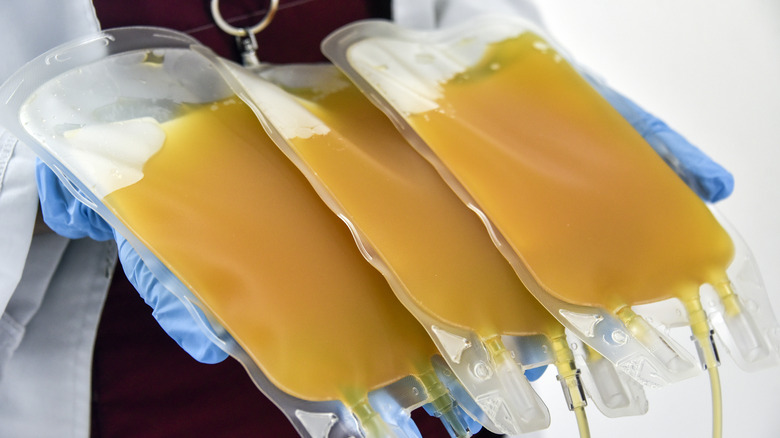What Happens To Your Body When You Donate Plasma
After any major disaster, there's almost always a call for people to donate blood to help those affected. But donation of blood plasma is as equally important, even though you may have never heard of it. It's a relatively quick and simple process that can mean the difference between life and death for victims of traumatic events or emergencies in order to stop the patient from losing too much blood (via American Red Cross). And even though it's a pretty safe procedure, there are still some possible side effects that you should be aware of.
Blood is made up of red blood cells, white blood cells, platelets, and plasma (via American Society of Hematology). The plasma is the liquid that the cells and platelets float around in. It contains antibodies to help with immunity, as well as proteins that help blood to clot (via Medical News Today). People being treated for bleeding, autoimmune disease, or respiratory conditions may need donated plasma to survive (via Healthline). Plasma can also be an essential element in the treatment of certain types of cancers.
Most side effects from plasma donation aren't serious
Plasma is almost always in very high demand, particularly from those with blood type AB, as it can be accepted by anyone (via Medical News Today). If you have AB blood and are considering plasma donation, there are a few things you should know before making an appointment. When you donate, your blood will be drawn and the plasma will then be separated out (via Healthline). What's left after the plasma is removed will be mixed with a saline solution and returned to your body. Because you are losing so much fluid during the donation process, it's possible that you may become dehydrated. This can lead to feeling lightheaded if you don't drink enough fluids to replenish what you've lost.
If you are allergic to the disinfectant that's used to clean your arm before the needle is inserted, you may experience swelling, redness, or itching around the skin where it was applied. These types of localized reactions are usually not dangerous, but if you start to have difficulty breathing or feel like you're going to pass out, this could be a sign of a more severe reaction. Bruising is another possible side effect, as is infection at the needle insertion site. While not likely, there is the rare possibility of nerve injury or even accidental artery puncture. Should this occur, you will receive immediate aid from the medical staff present. While donating plasma comes with some risk, it also comes with the opportunity to save one or more lives.

